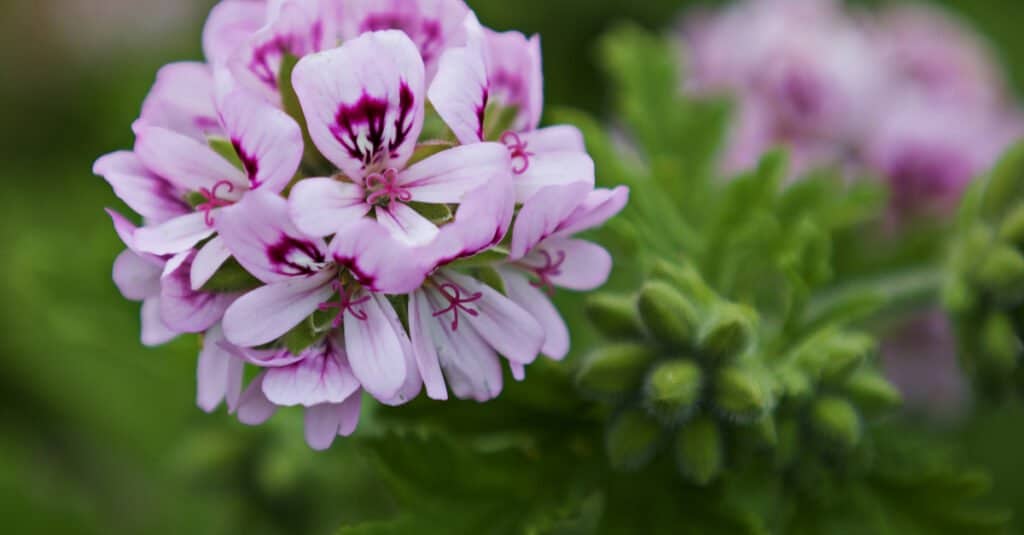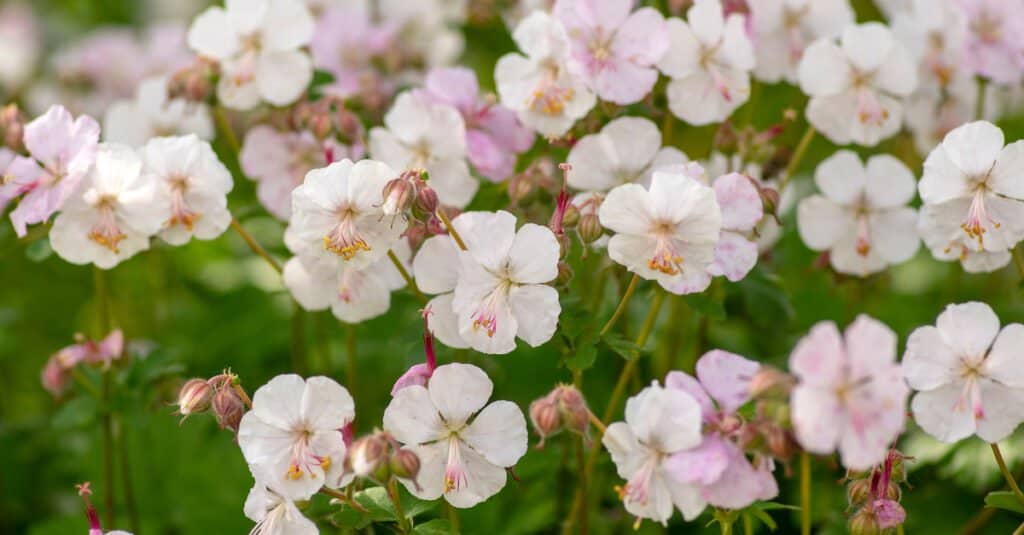We all love to beautify our living spaces and gardens. However pet owners have to be even more careful while selecting plants. Here we will look at one of the popular plants in our garden and answer the question are geraniums poisonous to dogs and cats or not.
Cranesbill geraniums, which are popular low-growing geraniums with spreading stems, are excellent for rock gardens. Annual, biennial, and perennial plants all have blooms with five symmetrical petals in shades of pink, blue, purple, or white.
The other popular geranium is scented geraniums, or (Pelargonium spp.), which are asymmetrical flowers in a wide range of colors and patterns. The zonal and ivy-leaved geraniums are among the frost-tender geraniums. These geraniums’ rigid leaves have scalloped edges and dark lines all around them. Aromatic essential oils are present in the leaves.
Geraniums occur in hundreds of types, making it difficult to tell which species of geranium is poisonous to pets. For example, are geraniums poisonous to dogs and cats, which are also known as cranesbills. On the other hand, dogs and cats can be poisoned by Pelargonium spp.
Are Geraniums Poisonous To Dogs or Cats?

Scented geraniums are poisonous to cays and dogs.
©tony mills/Shutterstock.com
Scented geraniums (Pelargonium spp.), a popular flower in gardens and pots, are poisonous to pets including dogs and cats. Depending on the plant’s chemicals and the degree of exposure, your pet may exhibit mild or severe symptoms. In rare cases, it can result in a coma.
It is possible for cats to eat geranium because they are naturally curious. If you’re concerned that your cat may have consumed geranium, contact your veterinarian. Even though geraniums may cause severe discomfort, fatality is rare.
Plant hardiness zones 10 and 11 of the U.S. Department of Agriculture are home to scented geraniums, the most toxic geraniums (Pelargonium spp). For the perfume industry, the apple, citrus, and mint scents of some cultivars of this plant are helpful.
Insect repellents and perfumes are made by extracting essential oils from their leaves. Colorful flowers and foliage can also be used to flavor a variety of jams and jellies. Cats and dogs may be able to access this plant, which grows nicely in pots or gardens, from both indoors and outside.
Geraniol and linalool, the major toxins in the scented geranium, can induce everything from skin irritation to vomiting for pets. Strangely enough, mosquito repellents are also made from these two ingredients.
Symptoms of Geranium Poisoning in Cats and Dogs

Your cat or dog will possibly suffer from anorexia if poisoned by geraniums.
©Peeraphat/Shutterstock.com
Vomiting, tiredness, and loss of appetite are among the symptoms of geranium poisoning in your dog or cat. A decrease in metabolic rate might also lead to other symptoms like fatigue or depression. Your pet’s heart rate and blood pressure may fall. Dogs may acquire a skin rash if they come in touch with geranium leaves that have been chewed or ripped.
Most cats will vomit or get diarrhea because of exposure to the plant’s poisonous oil component. It is possible for the feline to acquire muscle weakness and ataxia if it inhaled an excessive amount of geranium scents. In rare cases, it can result in a coma. Death is rarely reported but cannot be ruled out.
What To Do If Your Dog Or Cat Has Encountered Geranium

Cranesbills are not toxic, but if your pet is poisoned by other geranium plants, see your vet.
©Iva Vagnerova/Shutterstock.com
You should seek guidance from your local veterinarian or your poison control center if you suspect your dog or cat has been poisoned by geraniums. If your pet is experiencing mild skin irritation but is behaving normally, there is no cause for alarm. The irritation will likely go away on its own. If there is skin irritation, wash the affected skin areas with copious amounts of warm water containing some dish-washing soap.
Vomiting may also occur, as your dog or cat tries to reject this unpleasant substance. According to the American Society for Prevention of Cruelty to Animals, potential symptoms may also include anorexia and depression.
Observe your dog or cat if you think it chewed on geranium leaves or sniffed around among geranium plants. Some pets may only have mild symptoms, but if you notice geranium toxicity symptoms, call your vet asap.
The photo featured at the top of this post is © Iva Vagnerova/Shutterstock.com
Thank you for reading! Have some feedback for us? Contact the AZ Animals editorial team.






